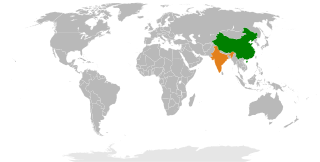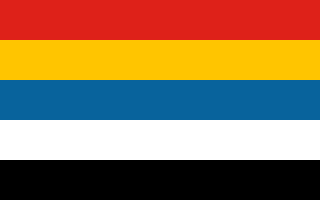Related Research Articles

China, officially the People's Republic of China, is a country in East Asia. It is the world's most populous country, with a population of around 1.428 billion in 2017. Covering approximately 9.6 million square kilometres, it is the world's third or fourth largest country by area. Governed by the Communist Party of China, the state exercises jurisdiction over 22 provinces, five autonomous regions, four direct-controlled municipalities, and the special administrative regions of Hong Kong and Macau.

Chinese is a family of East Asian analytic languages that form the Sinitic branch of the Sino-Tibetan languages. Chinese languages are spoken by the ethnic Han Chinese majority and many minority ethnic groups in China. About 1.2 billion people speak some form of Chinese as their first language.

The Communist Party of China (CPC) is the founding and ruling political party of the People's Republic of China (PRC) and the second largest political party in the world. The CPC is the sole governing party within mainland China, permitting only eight other, subordinated parties to co-exist, those making up the United Front. It was founded in 1921, chiefly by Chen Duxiu and Li Dazhao. The party grew quickly, and by 1949 it had driven the Kuomintang (KMT)'s Nationalist Government from mainland China to Taiwan after the Chinese Civil War, leading to the establishment of the People's Republic of China. It also controls the country's armed forces, the People's Liberation Army.

Hong Kong, officially the Hong Kong Special Administrative Region of the People's Republic of China (HKSAR), is a metropolitan area and special administrative region of China in the eastern Pearl River Delta by the South China Sea. With over 7.4 million people of various nationalities in a 1,104-square-kilometre (426 sq mi) territory, Hong Kong is one of the most densely populated places in the world.

The Korean War was a war between North Korea and South Korea. The war began on 25 June 1950 when North Korea invaded South Korea.

Mao Zedong, also known as Chairman Mao, was a Chinese communist revolutionary who became the founding father of the People's Republic of China (PRC), which he ruled as the chairman of the Communist Party of China from its establishment in 1949 until his death in 1976. Ideologically a Marxist–Leninist, his theories, military strategies, and political policies are collectively known as Maoism.

The Qing dynasty or Manchu dynasty, officially the Great Qing Empire, was the last imperial dynasty of China. It was established in 1636, and ruled China proper from 1644 to 1912. It was preceded by the Ming dynasty and succeeded by the Republic of China. The Qing multi-cultural empire lasted for almost three centuries and formed the territorial base for modern China. It was the fifth largest empire in world history.

Taiwan, officially the Republic of China (ROC), is a state in East Asia. Neighbouring states include the People's Republic of China (PRC) to the north-west, Japan to the north-east, and the Philippines to the south. The island of Taiwan has an area of 35,808 square kilometers (13,826 sq mi), with mountain ranges dominating the eastern two-thirds and plains in the western third, where its highly urbanised population is concentrated. Taipei is the capital and largest metropolitan area. Other major cities include Kaohsiung, Taichung, Tainan and Taoyuan. With 23.7 million inhabitants, Taiwan is among the most densely populated states, and is the most populous state and largest economy that is not a member of the United Nations (UN).

Shanghai is one of the four municipalities of the People's Republic of China. It is located on the southern estuary of the Yangtze, with the Huangpu River flowing through it. With a population of 24.28 million as of 2019, it is the most populous urban area in China and the second most populous city proper in the world. Shanghai is a global center for finance, innovation and transportation and the Port of Shanghai is the world's busiest container port.

The Sino-Indian War, also known as the Indo-China War and Sino-Indian Border Conflict, was a war between China and India that occurred in 1962. A disputed Himalayan border was the main cause of the war, but other issues also played a role. There had been a series of violent border skirmishes between the two countries after the 1959 Tibetan uprising, when India granted asylum to the Dalai Lama. India initiated a Forward Policy in which it placed outposts along the border, including several north of the McMahon Line, the eastern portion of the Line of Actual Control proclaimed by Chinese Premier Zhou Enlai in 1959.

Tibet is a region in Asia covering much of the Tibetan Plateau spanning about 2.5 million km2. It is the traditional homeland of the Tibetan people as well as some other ethnic groups such as Monpa, Tamang, Qiang, Sherpa, and Lhoba peoples and is now also inhabited by considerable numbers of Han Chinese and Hui people. Tibet is the highest region on Earth, with an average elevation of 5,000 m (16,000 ft). The highest elevation in Tibet is Mount Everest, Earth's highest mountain, rising 8,848 m (29,029 ft) above sea level.

The Tiananmen Square protests or the Tiananmen Square Incident, commonly known as the June Fourth Incident, were student-led demonstrations held in Tiananmen Square in Beijing during 1989. The popular national movement inspired by the Beijing protests is sometimes called the '89 Democracy Movement. The protests started on April 15 and were forcibly suppressed on June 4 when the government declared martial law and sent the military to occupy central parts of Beijing. In what became known as the Tiananmen Square Massacre, troops with assault rifles and tanks fired at the demonstrators and those trying to block the military's advance into Tiananmen Square. Estimates of the death toll vary from several hundred to several thousand, with thousands more wounded.

The Second Sino-Japanese War was a military conflict that was primarily waged between the Republic of China and the Empire of Japan from July 7, 1937, to September 2, 1945. The start of the war is typically considered to be the Marco Polo Bridge Incident in 1937, in which a dispute between Japanese and Chinese troops escalated into a full-scale invasion. Some sources in the modern People's Republic of China date the beginning of the war to the Japanese invasion of Manchuria in 1931. In China, it is known as the War of Resistance against Japanese Aggression.

Wuhan is the capital city of Hubei Province in the People's Republic of China. It is the largest city in Hubei and the most populous city in Central China, with a population of over 11 million, the ninth most populous Chinese city and one of the nine National Central Cities of China.

Traditional Chinese characters are Chinese characters in any character set that does not contain newly created characters or character substitutions performed after 1946. They are most commonly the characters in the standardized character sets of Taiwan, of Hong Kong and Macau. The modern shapes of traditional Chinese characters first appeared with the emergence of the clerical script during the Han dynasty and have been more or less stable since the 5th century.

Xi Jinping is a Chinese politician who has served as General Secretary of the Communist Party of China (CPC) since 2012, Chairman of the Central Military Commission (CMC) since 2012, and President of the People's Republic of China (PRC) since 2013. Xi has been the paramount leader, the highest-ranking official in China, since 2012 and he officially received the title of "leadership core" from the CPC in 2016. Xi has also been a member of the 17th, 18th, 19th CPC Politburo Standing Committee since 2007.

The Great Wall of China is the collective name of a series of fortification systems generally built across the historical northern borders of China to protect and consolidate territories of Chinese states and empires against various nomadic groups of the steppe and their polities. Several walls were being built from as early as the 7th century BC by ancient Chinese states; selective stretches were later joined together by Qin Shi Huang (220–206 BC), the first emperor of China. Little of the Qin wall remains. Later on, many successive dynasties have built and maintained multiple stretches of border walls. The most well-known sections of the wall were built by the Ming dynasty (1368–1644).

Beijing, alternatively romanized as Peking, is the capital of the People's Republic of China. It is the world's most populous capital city, with over 21 million residents within an administrative area of 16,410.5 km2. The city, located in North China, is governed as a municipality under the direct administration of the central government with 16 urban, suburban, and rural districts. Beijing is mostly surrounded by Hebei Province with the exception of neighboring Tianjin to the southeast; together, the three divisions form the Jingjinji megalopolis and the national capital region of China. Beijing is an important world capital and global power city, and one of the world's leading centers for culture, diplomacy and politics, business and economy, education, language, and science and technology. A megacity, Beijing is the second largest Chinese city by urban population after Shanghai and is the nation's cultural, educational, and political center. It is home to the headquarters of most of China's largest state-owned companies and houses the largest number of Fortune Global 500 companies in the world, as well as the world's four biggest financial institutions. It is also a major hub for the national highway, expressway, railway, and high-speed rail networks. The Beijing Capital International Airport has been the second busiest in the world by passenger traffic since 2010, and, as of 2016, the city's subway network is the busiest and longest in the world.

The Republic of China (ROC) was a sovereign state based in mainland China between 1912 and 1949, prior to the nationalist government's relocation to the island of Taiwan. It was established on 1 January 1912 after the Xinhai Revolution, which overthrew the Qing dynasty, the last imperial dynasty of China. The Republic's first president, Sun Yat-sen, served only briefly before handing over the position to Yuan Shikai, the leader of the Beiyang Army. Sun's party, the Kuomintang (KMT), then led by Song Jiaoren, won the parliamentary election held in December 1912. However, Song was assassinated on Yuan's orders shortly after; and the Beiyang Army, led by Yuan, maintained full control of the Beiyang government. Between late 1915 and early 1916, Yuan Shikai proclaimed himself Emperor of China before abdicating not long after due to popular unrest. After Yuan's death in 1916, the authority of the Beiyang government was further weakened by a brief restoration of the Qing dynasty. Cliques in the Beiyang Army claimed individual autonomy and clashed with each other during the ensuing Warlord Era.